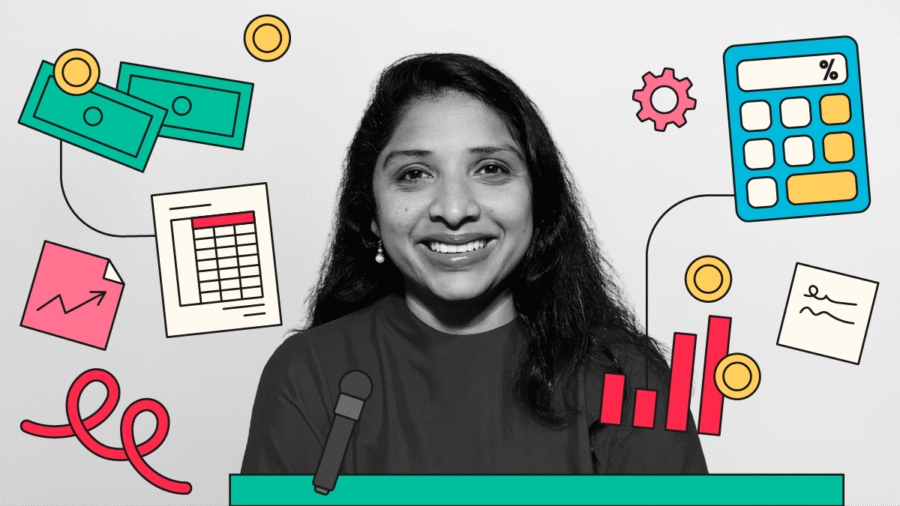
Rachita Sundar became chief financial officer at Qualtrics in November 2024, after nearly two decades spent working in finance and technology. She began her career as a developer before pivoting into finance at Microsoft, where she worked for 14 years. She then spent more than three years at HubSpot as senior vice-president of finance.
Now, at Qualtrics, Sundar is tasked with scaling up the business, shaping the finance function and guiding the company through a period of rapid technological change.
How did you become a CFO?
It was when Amy Hood became the CFO of Microsoft that the possibility really struck me. Seeing such a wonderful, intelligent, powerful woman in that role was inspiring to all the women in the organisation. Around that time, she asked me to help lead and grow Azure (Microsoft’s cloud-computing platform). I had so much fun working on that project and figuring out how to connect businesses across engineering, marketing and sales. That was when I realised I wanted to take on the challenge of scaling up companies.
What skills or traits does a good finance leader need?
First, the ability to influence people. As a finance leader, you are constantly influencing external and internal stakeholders with your leadership team and inspiring people by finding new ways of doing things for the business. The ability to influence and communicate is really important.
The second is building your village. One of the things I have learned through my career is that, as a leader, you are only as strong as your team. Making sure you are hiring people who are smart, building your direct peer community and having mentors and sponsors you can go to with questions is such an important thing for finance leaders to do, especially in a fast-moving industry.
What’s the biggest challenge facing your sector at the moment?
The biggest challenge for me as a CFO is determining whether we’re allocating capital the right way. The pace of innovation has accelerated with AI – and that costs a lot. At the same time, you have a business to preserve. As a mid-size company, we don’t have the balance-sheet strength of large enterprises to do both.
So the challenge is investing in the right areas, driving efficiency, divesting where needed and consciously making those capital allocation shifts. That requires behaviour changes in the core business and you have to influence those changes to fuel investment. Budgeting today is different than it was three years ago. You almost need to start from zero and continuously refine at the industry’s pace.
What’s the best business advice you’ve ever received?
When I first became a director, I was so excited to solve bigger and better problems. A mentor told me: “Let me manage your expectations – when you become a leader, 80% of the problems you’ll solve are people problems. And those people are the ones solving your business problems.” That was powerful advice that has stayed with me.
The second piece of advice is to always try to disrupt what you’re doing. If something is taking 20% of your time, think about how you can do it better and more efficiently. That mindset has helped me as I’ve developed in my career, because as a CFO you need to do both strategic capital allocations and detailed operational work.
Which book should every finance leader read at least once?
There are three books that I like to recommend. The Great Work of Your Life by Stephen Cope is a very philosophical book but it is important, as leaders must be grounded and understand their purpose while helping organisations change. Micro Habits: Small Changes, Big Impact by Walter Smith is another, because leaders have to keep reinventing themselves to be an effective. And Reshuffle: Who Wins When AI Restacks the Knowledge Economy by Sangeet Paul Choudary. This is a book I have been reading recently on how AI is changing the way that all of us work.
What do you do outside of work to protect yourself from burnout?
I have 14-year-old twins, a boy and a girl, so I’m learning and growing as a mother as they enter young adulthood. They’re very active with soccer, choir and swimming, and I’m involved in those communities.
For myself, it’s meditation and yoga. I’m a trained yoga instructor and although I haven’t taught in a few years, the practice grounds me. I try to return to it three or four times a week. Yoga combines breath, mind and body and it brings everything together. That’s what keeps me centred.
What is your proudest achievement in your current role?
In my eight months at Qualtrics, my proudest achievement has been setting the vision for the finance organisation and the company. I feel good about the progress we’ve made in bringing insights to the business and transforming finance from a back-office function to a strategic anchor that uses data to drive decisions.
If you were not a CFO, what would you be doing?
That’s a tough one. I might have continued as an engineer or I might have stayed home to raise my kids. But honestly, I think I would have been a yoga teacher. I trained for it and wanted to do it until I realised there’s not much money in that. Maybe when I retire, I’ll teach and run retreats to give back to the community.

Rachita Sundar became chief financial officer at Qualtrics in November 2024, after nearly two decades spent working in finance and technology. She began her career as a developer before pivoting into finance at Microsoft, where she worked for 14 years. She then spent more than three years at HubSpot as senior vice-president of finance.
Now, at Qualtrics, Sundar is tasked with scaling up the business, shaping the finance function and guiding the company through a period of rapid technological change.





